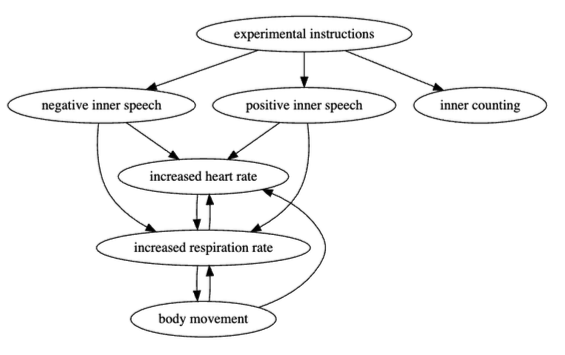How to control your heart with your mind
Physical activity like running increases our heart rate. But what about our thoughts? Researchers from Aarhus University and Copenhagen University recently investigated whether we can control our heart rate through our thoughts using COBE Lab's resources.
Background
Our heart rate is controlled by the autonomic nervous system, which is largely believed to be independent of cognition. In theory it should not be possible to control our heart rate with our mind. However, some research suggests that it is possible. When asked what they do to increase their heart rate, people answer that they think about things that make them angry or anxious. The sympathetic nervous system, which is part of the autonomic nervous system, most often controls increased heart rate due to our fight-or-flight response or when the body is strained like during exercise or when we are sick. Other research suggests that positive inner speech is associated with calming the speaker down.
The researchers of this study investigated whether inner speech generally affects heart rate and whether negative inner speech specifically affects it more than positive inner speech. They hypothesised that (p. 3224):
- emotional inner speech can induce increased heart rate compared to non-emotional inner speech (inner counting) in the absence of any physical movement.
- emotional inner speech with negative valence will increase heart rate to a larger extent than inner speech with positive valence, in the absence of any physical movement.
The study
66 participants participated in this study. Each participant rested on a daybed for 10 minutes before the experiment started. The study consisted of two sessions.
- Session 1: C-P-C-P (or P-C-P-C)
- Session 2: N-C-N-C (or C-N-C-N)
The participants were instructed to either talk internally for 180 sesonds using either positive language (P), negative language (N) or count internally (C). Between each trial, the participants paused for 10 seconds before continuing. While performing the task, the participants wore equipment that monitored their movement, heart rate and breathing.
Results
Participants who moved too much during the experiment were excluded from analysis, which resulted in 48 participants.
They found that emotional inner speech increases heart rate more than inner counting.
Negative inner speech did not increase heart rate more than positive inner speech, as shown in the figure below.
They also replicated previous findings that increased heart rate is associated with increased breathing rate.

Discussion
Although the results indicate that we can increase our heart rate through emotional inner speech, the effect size is small. This means that there is little practical application of the findings. The heart rates of the participants increased with "one beat per minute on average across the 180 second trials compared to inner counting" (p. 3227). This is not much considering that standing up can increase our heart rate by 10-20 beats per minute. However, given the that autonomic nervous system controls our heart rate and increased heart rate is usually associated with bodily strain and need for oxygen in the body and brain, we should not expect a large effect size.
The results suggest that inner counting is a more effective strategy to calm us down than positive inner speech, contrary to what previous research suggests. However, it is also possible that the participants' heart rate increased more in the emotional inner speech trials than the inner counting trials because emotional inner speech is a more difficult task.
The researchers suggest a simple causal model pictured in the figure below. The experiment causes the participants to enter one of the three conditions. The inner counting condition did not significantly affect heart rate which is why there is no arrow to increased heart rate. The two emotional inner speech conditions did increase heart rate. Previous research has also shown emotional inner speech to increase breathing. Previous findings, which they also replicate, suggest that there is a bidirectional relationship between increased heart rate and increased breathing. As mentioned previously, it is also well-known that physical movement increases heart rate and there is therefore also an arrow from body movement to increased heart rate. Physical movement also influences breathing through a bidirectional relationship.
Testing the validity of the model was beyond the scope of the paper, and more research is therefore needed.

Conclusions
The results lead the researchers to conclude that the study "found support for the hypothesis that emotional inner speech yields a sympathetic nervous system response, but not support for the hypothesis that this was specific to negative emotional inner speech" (p. 3228).
The research was published in 2024 in Proceedings of the Annual Meeting of the Cognitive Science Society and was titled 'Heart talk: Emotional inner speech increases heart rate'. Click on the link to read the paper.
The short story
- Emotional inner speech increases heart rate more than inner counting.
- Negative inner speech does not increase heart rate more than positive inner speech.
The researchers
- Mikkel Wallentin: Professor at the Department of Linguistics, Cognitive Science and Semiotics and the Department of Clinical Medicine - Center of Functionally Integrative at Aarhus University.
- Line Kruse: Research Assistant at the Department of Linguistics, Cognitive Science and Semiotics.
- Anja Feibel Meerwald
- David Trøst Fjendbo
- Johanne Nedergaard: Postdoc at the Department of Nordic Studies and Linguistics at Copenhagen University.